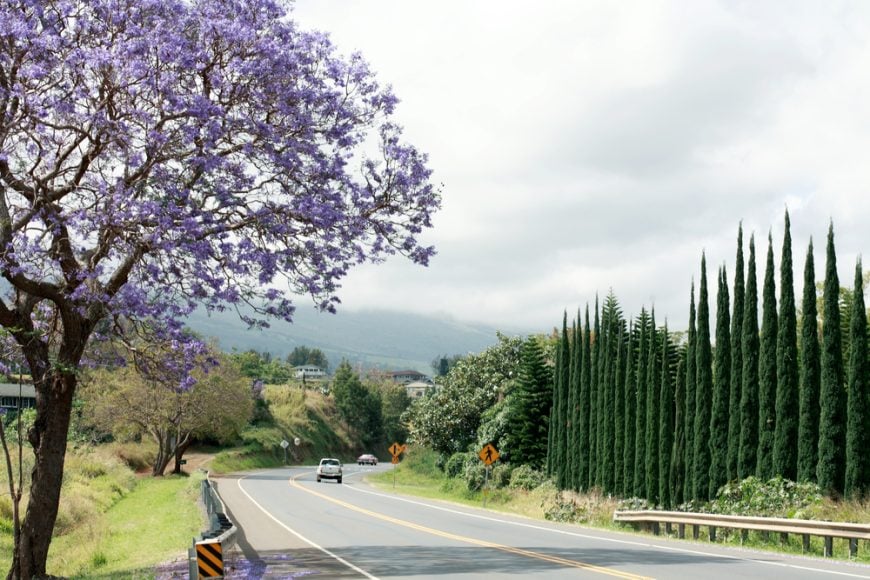When most people think of Hawaii, they envision bustling beaches and crowded tourist spots.
Join us as we count down the most secluded towns in Hawaii, each offering its own unique allure.
Discover the serene landscapes, welcoming communities, and hidden treasures that make these places truly special.

Shutterstock
Known for its cooler climate and pastoral landscapes, it offers breathtaking views of Mauis central valley and coastlines.
The main industries are agriculture and farming, with many residents cultivating onions, flowers, and coffee.
Where is Kula?

Located in Upcountry Maui, Kula stretches along the western slopes of the Haleakala volcano.
The towns remoteness comes from its position off the main coastal roads, accessible primarily via winding mountain routes.
This serene village offers a peaceful retreat amid lush rainforests and unique volcanic landscapes.

The main industries include tourism, art, and small-scale agriculture.
Where is Volcano Village?
Volcano Village is located on the Big Island of Hawaii, about 30 miles southwest of Hilo.

The area is surrounded by towering sea cliffs and rugged coastlines, offering stunning views and unparalleled solitude.
The main industry is historical tourism, managed carefully to preserve the sites integrity.
Where is Kalaupapa?

Its isolation was originally intentional, chosen to quarantine patients in the 19th century.
This remoteness contributes to the areas serene and contemplative ambiance.
The main industry is subsistence farming and small-scale tourism.

Its seclusion comes from its off-the-beaten-path location beyond Hana, making it a tranquil escape from more crowded areas.
Where is Kipahulu?
Kipahulu is situated on the eastern tip of Maui, past the town of Hana along the Hana Highway.

The areas remoteness is accentuated by the winding roads and distance from major towns.
The journey involves navigating narrow, cliffside roads that deter many travelers, adding to its secluded nature.
The town is dotted with art studios and galleries showcasing local artists.

The main industries are coffee farming and the arts, contributing to a relaxed, creative atmosphere.
Holualoas seclusion is due to its hillside location above Kailua-Kona, offering tranquil surroundings with panoramic ocean views.
Where is Holualoa?

The town is a short drive from Kailua-Kona but feels worlds apart due to its elevation and rural landscape.
Nearby attractions include the black sand beaches of Punaluu and green sand beaches at Papakolea.
The main industries are agriculture and small businesses catering to travelers passing through.

Where is Naalehu?
Its remoteness comes from being situated in one of the islands least populated and least developed regions.
The town is accessible by car via a scenic drive through lava fields and open landscapes.

The main industries are tourism, arts, and small-scale agriculture.
Where is Hawi?
Hawi is situated at the northern end of the Kohala Coast on the Big Island.

The drive to Hawi offers stunning coastal views and a sense of leaving the more developed areas behind.
The main industries are fishing, agriculture, and small-scale tourism.
Kaunakakai remains untouched by major development, making it secluded and preserving a slower pace of life.

Where is Kaunakakai?
Kaunakakai is located on the south shore of Molokai, roughly in the center of the island.
Its seclusion comes from Molokais overall isolation and resistance to mass tourism.

The town is accessible by small plane from Oahu or Maui, or by ferry from Maui.
Limited transportation options and the islands commitment to preserving its cultural heritage contribute to Kaunakakais serene and secluded atmosphere.
Where is Lanai City?

The quiet streets and relaxed pace make Lanai City a unique and secluded destination.
The main industries are agriculture, fishing, and small-scale tourism.
Hanas seclusion is due to its remote location and limited development, preserving its status as a hidden paradise.

Where is Hana?
The drive can take several hours, deterring some visitors and keeping Hana less crowded.



